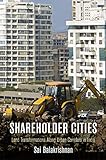Shareholder Cities : Land Transformations Along Urban Corridors in India / Sai Balakrishnan.
Material type: TextSeries: The City in the Twenty-First CenturyPublisher: Philadelphia : University of Pennsylvania Press, [2019]Copyright date: ©2020Description: 1 online resource (256 p.) : 29 illusContent type:
TextSeries: The City in the Twenty-First CenturyPublisher: Philadelphia : University of Pennsylvania Press, [2019]Copyright date: ©2020Description: 1 online resource (256 p.) : 29 illusContent type: - 9780812251463
- 9780812296303
- Economic development -- India -- Maharashtra
- Gram sabha -- India -- Maharashtra
- Land use -- India -- Maharashtra
- Urbanization -- India -- Maharashtra
- POLITICAL SCIENCE / Public Policy / City Planning & Urban Development
- African Studies
- Agriculture
- Asian Studies
- Business
- Economics
- Middle Eastern Studies
- Public Policy
- Urban Studies
- 333.770954 23
- HD879.M444 B35 2019eb
- online - DeGruyter
- Issued also in print.
| Item type | Current library | Call number | URL | Status | Notes | Barcode | |
|---|---|---|---|---|---|---|---|
 eBook
eBook
|
Biblioteca "Angelicum" Pont. Univ. S.Tommaso d'Aquino Nuvola online | online - DeGruyter (Browse shelf(Opens below)) | Online access | Not for loan (Accesso limitato) | Accesso per gli utenti autorizzati / Access for authorized users | (dgr)9780812296303 |
Frontmatter -- Contents -- List of Abbreviations -- Introduction. Corridor Regions -- Chapter 1. From Railways and Big Dams to Economic Corridors -- Chapter 2. From Sugar to Real Estate -- Chapter 3. From Forests to IPO -- Chapter 4. From Waste Land to SEZ -- Chapter 5. Shareholder Cities -- Appendix I. Agrarian to Urban Land-Use Change -- Appendix II. Research Methodology -- Notes -- Bibliography -- Index -- Acknowledgments
restricted access online access with authorization star
http://purl.org/coar/access_right/c_16ec
Economic corridors- ambitious infrastructural development project that newly liberalizing countries in Asia and Africa are undertaking-are dramatically redefining the shape of urbanization. Spanning multiple cities and croplands, these corridors connect metropolises via high-speed superhighways in an effort to make certain strategic regions attractive destinations for private investment. As policy makers search for decentralized and market-oriented means for the transfer of land from agrarian constituencies to infrastructural promoters and urban developers, the reallocation of property control is erupting into volatile land-based social conflicts.In Shareholder Cities, Sai Balakrishnan argues that some of India's most decisive conflicts over its urban future will unfold in the regions along the new economic corridors where electorally strong agrarian propertied classes directly encounter financially powerful incoming urban firms. Balakrishnan focuses on the first economic corridor, the Mumbai-Pune Expressway, and the construction of three new cities along it. The book derives its title from a current mode of resolving agrarian-urban conflicts in which agrarian landowners are being transformed into shareholders in the corridor cities, and the distributional implications of these new land transformations.Shifting the focus of the study of India's contemporary urbanization away from megacities to these in-between corridor regions, Balakrishnan explores the production of uneven urban development that unsettles older histories of agrarian capitalism and the emergence of agrarian propertied classes as protagonists in the making of urban real estate markets. Shareholder Cities highlights the possibilities for a democratic politics of inclusion in which agrarian-urban encounters can create opportunities for previously excluded groups to stake new claims for themselves in the corridor regions.
Issued also in print.
Mode of access: Internet via World Wide Web.
In English.
Description based on online resource; title from PDF title page (publisher's Web site, viewed 21. Jun 2021)


